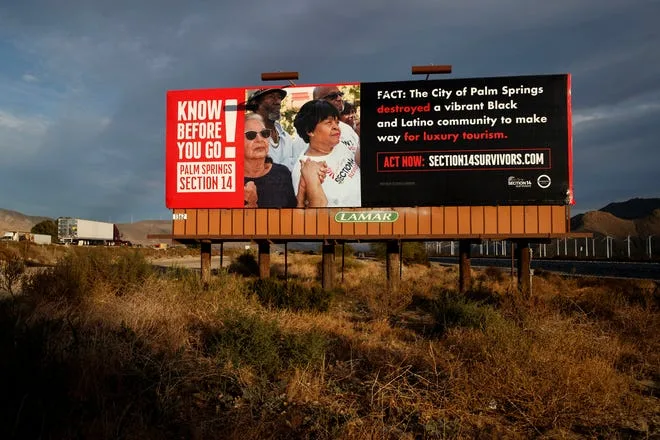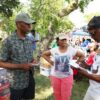
The Palm Springs City Council pledged Thursday night to take several actions to right what Mayor Jeffrey Bernstein described as the “wrong” that occurred when city money was used to clear homes on Section 14 decades ago. The steps include contributing to a community land trust to build more affordable housing and exploring the feasibility of building a “healing center” or historic park dedicated to Section 14.
But Bernstein did not say whether the council would agree to any cash payments to living former residents of the area or the descendants of those who’ve died.
Pearl Devers, a former Section 14 resident who leads a group seeking restitution, called the pledges by the council Thursday a positive step, as did the group’s lawyer. But they said a legal claim Devers and other residents filed in late 2022 seeking restitution has not been settled, and negotiations will continue.
“We’re just really happy that the city is choosing to work with us and meet us halfway somewhere so that we can all come to a solution that will benefit Palm Springs,” Devers said.
In prepared remarks during a city council meeting, Bernstein said the council gave the city attorney direction on how to deal with the legal claim, but did not say what that direction was.
Bernstein also said the council was dedicated to “continuing the conversation with the survivors of Section 14 and all residents of Palm Springs as we work together to address the inequities of the past.”
No other council members spoke, and Bernstein read the statement following an hours-long closed-door meeting between the council and City Attorney Jeffrey Ballinger. It was the latest of many such closed discussions since the claim was filed in 2022.
Bernstein gave few details on how much any of the steps he outlined would cost, when they would happen or how the city would pay for them. He did say the council was directing city staff to coordinate with county, state and federal governments for possible funding related to the healing center or park.
What is Section 14?
Section 14 is a one-square-mile section of land adjacent to downtown Palm Springs owned by members of the Agua Caliente Band of Cahuilla Indians. For decades, many people of color either rented or built their own homes there, in part because racist housing policies denied them the ability to buy homes elsewhere in the city.
The clearing of the land and evictions of residents followed federal decisions allowing tribal members to enter into long-term leases that for the first time made possible business and residential development on land they owned.
The clearing also followed years of debate about how to respond to poor living conditions in parts of Section 14, including lack of trash service or adequate water supply. Two women who lived in the area as children told The Desert Sun for a 2016 article that there was wide disparity in living conditions, with some people in safe, well-built houses like their family’s and other people in trailers or shacks. Some of the homes were ultimately declared unsafe and destroyed.
While there is widespread agreement that the city oversaw and initially paid for some burnings and demolitions of homes, some in the city — including members of a group called Friends of Frank Bogert — have disputed that the city did anything wrong. They say the historical record shows that the city provided resources for the demolitions at the behest of the tribe, required that homes only be destroyed after the city was provided proof that eviction notices had been served and that the city was reimbursed for the demolitions and burnings by the federal government.
The Friends of Frank Bogert group, named after the man who was mayor from 1958 to 1966, was formed amid controversy over his legacy as the city’s leader during the clearing of Section 14. In 2021, the city council voted to begin the process of removing Bogert’s statue from city hall grounds, and it was removed in mid-2022.
The Section 14 Survivors group’s legal claim and other criticism of the city’s actions have cited in part a 1968 report written by a California deputy attorney general that called the clearing of Section 14 a “city-engineered holocaust,” though it also found the city had not done anything illegal. However, others say the credibility of that report was called into question last year when the city released new documents from the period that contradicted several of the report’s conclusions, including the allegation that the city kept no records of the evictions.
An apology and a legal claim
In 2021, the city council voted to apologize for what it described as the city’s wrongful role in the removals and said it would explore providing reparations, but has taken little public action since.

On Thursday, Bernstein said the city would focus its efforts on ways to increase economic opportunities, particularly for small businesses in underserved communities. He said the first step would be to have staff review the results of a new small business pilot program in the city and possibly expand funding for it.
“The city of Palm Springs recognizes that marginalized minority communities have been negatively impacted by city actions in the past,” he said.
Bernstein also said the council remains committed to hiring a consultant to do independent historical research on Section 14, something it decided to do almost a year ago in a split vote, but has not done. He said the council directed staff to report back on the hiring process for the consultant within 90 days.
Bernstein did not explain why the city has taken no steps toward hiring or seeking such a consultant over the past year, and he and other council members have for months refused repeated requests from The Desert Sun to discuss that and other aspects of the Section 14 issue.
The 2022 claim stated that the estimated harm caused by the city of Palm Springs amounted to “upward to $2 billion.” However, the group, which calls itself Section 14 Survivors, has never specified an amount of damages it was seeking. Members have repeatedly said they preferred to negotiate a resolution with the city, rather than continuing a legal fight or taking it to court.
Both Devers and Areva Martin, the attorney for the group, said they welcomed Bernstein’s comments as a sign that the council was taking responsibility for the city’s role and dedicated to taking action to address it. But they said they did not consider this the end of the process and don’t believe the city does either.
Devers said her organization’s position hadn’t changed as a result of the announcement and that it will continue doing the same thing it has been doing, which she described as fighting for restitution to bring the process to a conclusion.
“We have not resolved anything,” she said. “There’s talks about what can be done and what will be done and so all of that has to be ironed out, we’re still in the middle of negotiations and we have to see what the end is going to be.”
Martin said the major issue after the city returned to the negotiating table in recent weeks was “just to keep talking” so she was glad the council signaled that will happen.
“That’s tremendous progress because in October of last year, we weren’t talking. So I’m encouraged. I want to thank them in advance for giving their team the authority to do that,” she said.
Martin said she and Ballinger have been talking on about a weekly basis recently. She also said neither she or her clients had entered into any agreement regarding the actions the council committed to and that the claim was still open and had not been resolved.
“We’re going to stay at that table,” Martin said. “We believe this gives us an opportunity to get something really meaningful done.”
Paul Albani-Burgio covers growth, development and business in the Coachella Valley. Follow him on Twitter at @albaniburgiop and email him at paul.albani-burgio@desertsun.com.


